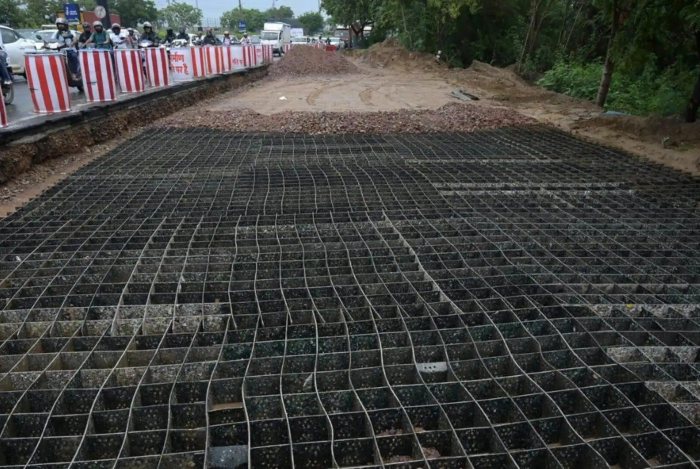New Delhi, July 17, 2025: In a milestone for circular economy innovation and sustainable infrastructure, India has launched its first field trial using plastic waste-based geocells for road construction. This “waste to wonder” initiative is currently being tested in harsh terrains under the supervision of the Military Engineering Services (MES) and the National Highways Authority of India (NHAI), aiming to transform how the country builds roads—especially in ecologically sensitive and logistically challenging regions.
The pilot project involves the use of hexagonally structured geocells made from recycled plastic, used to stabilize the soil base in road construction. These plastic geocells are being tested across five strategic locations in Assam, Ladakh, Rajasthan, Gujarat, and West Bengal.
According to officials, these trials are designed to evaluate the load-bearing capacity, environmental performance, and long-term durability of plastic-based geocells in comparison to conventional materials like steel or concrete.
If successful, the technology could be scaled across the country, offering a dual benefit: reducing plastic pollution while enhancing road strength and cost efficiency.
India generates over 3.4 million tonnes of plastic waste annually, of which a significant portion remains unmanaged or ends up in landfills and water bodies. The trial marks a major breakthrough in creating productive end-of-life applications for plastic, aligning with India’s national goals under the Plastic Waste Management Rules, Swachh Bharat Mission, and commitments made at the COP climate summits.
By integrating plastic into infrastructure instead of disposal chains, the government is sending a strong message: waste is a resource when innovation leads the way.
Multi-Sectoral Collaboration: A New Template for Green Engineering
What sets this project apart is the collaborative model. The field trial is being conducted by the MES in tandem with NHAI and supported by DRDO, IITs, and private technology partners. This convergence of military engineers, civil technocrats, and environmental policymakers signals a new era of mission-mode public-private partnerships for sustainable infrastructure.
The use of geocells is not new globally. Countries like the United States, Canada, and Australia have experimented with geosynthetics for decades. But India’s bold step to replace virgin polymers with post-consumer plastic waste in these applications is what makes the initiative truly pioneering.
Challenges Ahead: Not Just a Silver Road
While the potential of plastic geocell roads is enormous, the initiative faces several challenges:
- Quality Control: Not all plastic waste is suitable for geocell manufacturing. Standardization in segregation, cleaning, and processing is crucial.
- Scaling Supply Chains: Establishing decentralized plastic waste collection and processing hubs near construction sites will be essential to scale this sustainably.
- Environmental Risk Assessment: While roads will lock plastic into the ground, long-term studies are needed to ensure microplastic leaching or degradation does not occur.
Despite these concerns, experts agree that the initiative sets the right tone for India’s infrastructure narrative—one that is resilient, regenerative, and resource-efficient.
Editorial Perspective: From Linear Waste to Circular Roads
At TheCSRUniverse, we view this initiative as a powerful example of how sustainability goals can be operationalized in public infrastructure projects. Roads built from plastic waste could redefine both waste management and green engineering, particularly in terrains where traditional materials struggle due to weight, cost, or corrosion.
But this must not remain a one-off pilot. For true impact, India needs a national policy roadmap for scaling plastic-waste-integrated construction technologies—with clear guidelines, incentives for contractors, and environmental oversight.
Furthermore, by institutionalizing such models, India can offer a replicable framework for other countries in the Global South facing twin crises of plastic pollution and crumbling infrastructure.
You may also like to read:
BPCL Launches Geocell Technology to Tackle Plastic Waste in Road Construction




















.jpg)



